

Dr. Seuss, The Lorax "Let it Grow!" Can a hashtag change the fashion industry? Birke Baehr: What's wrong with our food system. Australia ranks 20th on progress towards the Sustainable Development Goals. Australia may be home to some of the world’s most liveable cities, but we have a long way to go to meet the world’s Sustainable Development Goals (SDGs).
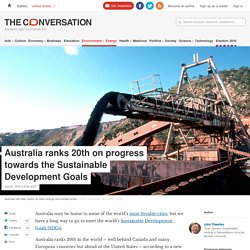
Australia ranks 20th in the world – well behind Canada and many European countries but ahead of the United States – according to a new index that compares different nations' performance on the SDGs, which were adopted last September. Launched at this week’s United Nations SDG talks in New York, the index marks each country’s performance towards the 17 goals. SWITCH-Asia.eu - Six Chinese Banks Endorse the Energy Efficiency Finance Statement promoted in the G20, Joining a Global Mobilization of over 115 Financial Institutions Committed to Financing the Shift to Energy Efficiency. Facing acute environmental challenges, China has made the greening of its economy a priority and has embraced sustainable finance with a remarkable leap in the green bond market in 2016.
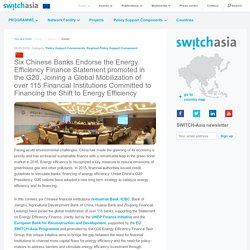
Energy efficiency is recognized a key measure to reduce emissions of greenhouse gas and other pollutants. In 2015, financial authorities issued credit guidelines to stimulate banks’ financing of energy efficiency. Under China’s G20 Presidency, G20 nations have adopted a new long term strategy to catalyze energy efficiency and its financing. In this context, six Chinese financial institutions (Industrial Bank, ICBC, Bank of Jiangsu, Agricultural Development Bank of China, Huaxia Bank and Zhujiang Financial Leasing) have joined the global mobilization of over 115 banks supporting the Statement on Energy Efficiency Finance. As G20 President, China is developing a G20 Energy Efficiency Leading Program that covers the finance sectors.
Statewide Waste and Resource Recovery Infrastructure Plan - Sustainability Victoria. The recently launched 30 year Statewide Waste and Resource Recovery Infrastructure Plan (state infrastructure plan) is led by Sustainability Victoria on behalf of the Victorian Government.
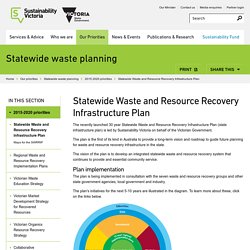
The plan is the first of its kind in Australia to provide a long-term vision and roadmap to guide future planning for waste and resource recovery infrastructure in the state. The vision of the plan is to develop an integrated statewide waste and resource recovery system that continues to provide and essential community service. As global per-capita fish consumption hits all-time high, UN warns on overharvesting. The latest edition of the agency’s State of World Fisheries and Aquaculture report attributes stronger aquaculture supply and firm demand, record hauls for some key species and reduced wastage as some of the reasons for the increased consumption.
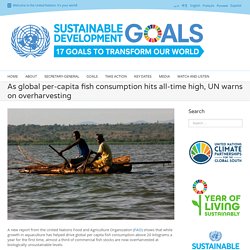
It also notes that despite notable progress in some areas, the state of the world’s marine resources has not improved. “Life below water, which the Sustainable Development Agenda commits us to conserve, is a major ally in our effort to meet a host of challenges, from food security to climate change,” FAO Director-General José Graziano da Silva said in a news release. Sustainable living - no bills and fresh food for your family.. - ABC Perth - Australian Broadcasting Corporation.
The International Panel on Chemical Pollution. _FactSheet. Dear Future Generations: Sorry.
Water Pollution. Last Week Tonight with John Oliver: Fashion (HBO) Last Week Tonight with John Oliver: Food Waste (HBO) The Story of Stuff. The Story of Stuff, originally released in December 2007, is a 20-minute, fast-paced, fact-filled look at the underside of our production and consumption patterns.
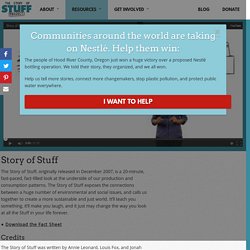
The Story of Stuff exposes the connections between a huge number of environmental and social issues, and calls us together to create a more sustainable and just world. It’ll teach you something, it’ll make you laugh, and it just may change the way you look at all the Stuff in your life forever. Download the Fact Sheet. Nike and Adidas show cautious support for eco-friendly dye technology. It has been a significant step forward for the textile sector.
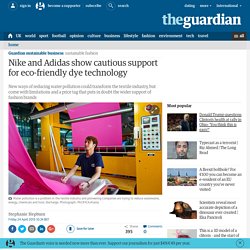
Up until now the effluent from dye houses that can often be seen in rivers flowing through the textile manufacturing areas of India, China and elsewhere is a result of unabsorbed dyes, chemicals and heavy salts that are used during the dyeing process. A number of companies, DyeCoo, ColorZen and AirDye have set out to address this pollution by designing waterless dye technology. The result is a reduction in wastewater, energy, chemicals and toxic discharge to such a degree that it could revolutionise the textile industry. Major brands including Nike and Adidas have been integrating waterless dye technologies into their product lines, but costs and limitations have experts in the textile industry worried that the support will not last.
The future of food is ugly as Walmart takes movement mainstream. The future of produce is ugly.
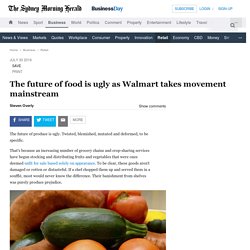
Twisted, blemished, mutated and deformed, to be specific. That's because an increasing number of grocery chains and crop-sharing services have begun stocking and distributing fruits and vegetables that were once deemed unfit for sale based solely on appearance. To be clear, these goods aren't damaged or rotten or distasteful. If a chef chopped them up and served them in a soufflé, most would never know the difference. Their banishment from shelves was purely produce prejudice. In recent years, a small number of eco-conscious consumers have begun buying imperfect produce, often at discounted prices, in an effort to chip away at the planet's staggering level of food waste. We can save the earth without giving up bacon. You'd have to be living under a rock to have missed the memo: Too much meat is bad for your health , responsible for immense animal cruelty on factory farms, to blame for speeding up climate change, at fault for squeezing out rare species and more.
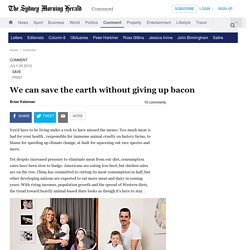
Yet despite increased pressure to eliminate meat from our diet, consumption rates have been slow to budge. Americans are eating less beef, but chicken sales are on the rise. China has committed to cutting its meat consumption in half, but other developing nations are expected to eat more meat and dairy in coming years.
With rising incomes, population growth and the spread of Western diets, the trend toward heavily animal-based diets looks as though it's here to stay . Story of Stuff. #GlobalGoals: Why Unilever supports Goal 12: Responsible Consumption and Production. Theconversation. In 2006, US researchers Philippe Grandjean and Philip Landrigan published a list of industrial and environmental chemicals that cause serious neurological and behavioural problems.
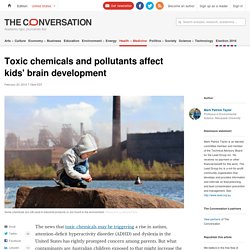
The list included lead, methylmercury (from fish containing high levels of mercury), engine coolants, arsenic and a solvent called toluene. Many of the chemicals on the list are already banned or controlled in Australia. But some are still used in industrial products or are found in the environment, so keeping track of their use and distribution is nearly impossible. While individual case studies document local exposures, this data has not been integrated in any systematic way across Australia. Let’s look at some key chemicals found in our soil, air and water – mostly around mines and industrial sites.
Soil contaminants. Jason Clay: How big brands can help save biodiversity. Paul Gilding: The Earth is full. Peter Diamandis: Abundance is our future. David MacKay: A reality check on renewables. William McDonough: Cradle to cradle design. Goal 12: Responsible Consumption & Production. Andras Forgacs: Leather and meat without killing animals. Steve Howard: Let's go all-in on selling sustainability. Chris McKnett: The investment logic for sustainability. Leyla Acaroglu: Paper beats plastic? How to rethink environmental folklore. Jessi Arrington: Wearing nothing new. Countries with the most natural disasters, by type in 2014. Environment in China - Statistics & Facts.
Rapid industrial development and the dominance of economic growth in political considerations have taken their toll on the environment in China.
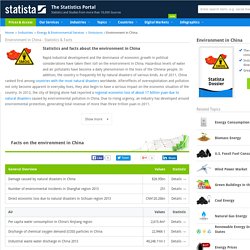
Hazardous levels of water and air pollutants have become a daily phenomenon in the lives of the Chinese people. In addition, the country is frequently hit by natural disasters of various kinds. As of 2011, China ranked first among countries with the most natural disasters worldwide. Aftereffects of overexploitation and pollution not only become apparent in everyday lives, they also begin to have a serious impact on the economic situation of the country. In 2012, the city of Beijing alone had reported a regional economic loss of about 17 billion yuan due to natural disasters caused by environmental pollution in China.
Probably the most prominent of China’s environmental issues is the country’s air pollution. China’s water reserves also suffer heavily from industrial pollution. Fostering sustainable economic growth, transformation and promoting sustainable consumption and.
Sustainable Development Goals. Sustainable Development Goals End poverty in all its forms everywhere End hunger, achieve food security and improved nutrition and promote sustainable agriculture. SDG 12: Responsible consumption, production. Women at a community centre in Darfur, Sudan. Photo: Albert González Farran/UN Achieving economic growth and sustainable development requires that we urgently reduce our ecological footprint by changing the way we produce and consume goods and resources. Agriculture is the biggest user of water worldwide, and irrigation now claims close to 70 percent of all freshwater appropriated for human use. The efficient management of our shared natural resources, and the way we dispose of toxic waste and pollutants, are important targets to achieve this goal.
Encouraging industries, businesses and consumers to recycle and reduce waste is equally important, as is supporting developing countries to move towards more sustainable patterns of consumption by 2030. A large share of the world population is still consuming far too little to meet even their basic needs. Victorian unconventional gas exploration ban to end fracking and CSG extraction. Updated. What is fracking? › Ask an Expert (ABC Science) We hear a lot about fracking as a mining technique for extracting gas from coal seams and shale deposits.
What is fracking and why is it controversial? Drilling companies suggest trillions of cubic feet of shale gas may be recoverable from underneath parts of the UK through a process known as "fracking". The Problems of Chemical Pollution: in China. Standard Page - 2011-06-28. What is Chemical Pollution? - The World Counts. TheWorldCounts, 14 December, 2014. Beyond reduce, reuse, recycle: The 9 'R's of a sustainable life. When it comes to recycling, Australians have a great reputation. Where do Australia’s greenhouse gases come from? Australians are the highest greenhouse gas polluters, per-person, among the Organisation for Economic Co-operation and Development (OECD) populations. Theconversation. The recently elected One Nation senator from Queensland, Malcolm Roberts, fervently rejects the established scientific fact that human greenhouse gas emissions cause climate change, invoking a fairly familiar trope of paranoid theories to propound this belief.
Theconversation. Sdg_index_and_dashboards_compact. Theconversation. Theconversation. Sustainable: A Documentary. Plastic Planet - Die Seite über das Plastik-Zeitalter und die Folgen - mit Special zum Film Plastic Planet! A Documentary Film. Important Policy News on Factory Farming & the Food Industry. WASTE LAND. The Business of Fast Fashion. Sustainable Production and Consumption. 3 Tips to Help Reduce Food Waste. Here’s How Sweden is Recycling 99% of its Waste. Edible Packaging Made From Milk Could Erase Waste. 5 Small Ways You Can Change The World Today. Home. 11 Groups Fighting to End Food Waste and Feed the World. In Win for the Earth, Microbeads Will Be Banned in the UK By 2017.
Cotton On Group Corporate. Melbourne start-up wages war on food waste. Can big brands catch up on sustainable fashion?